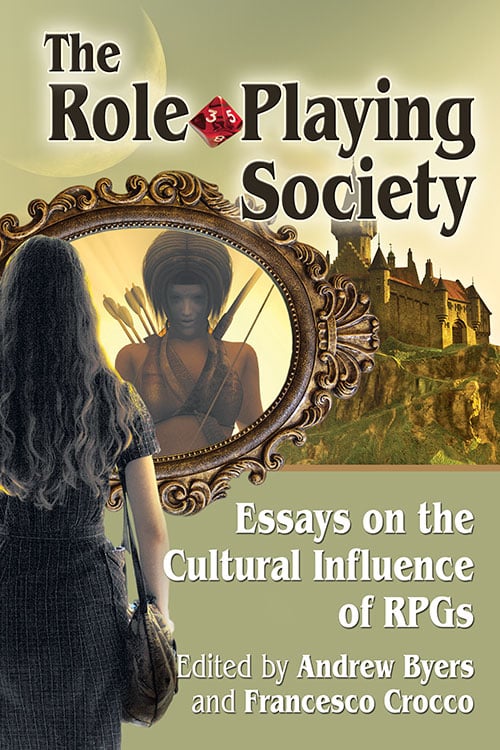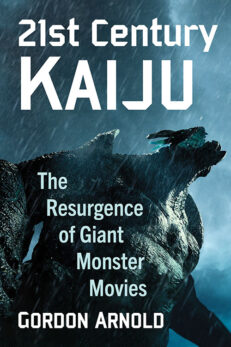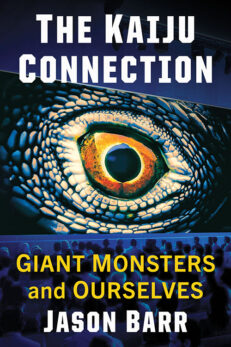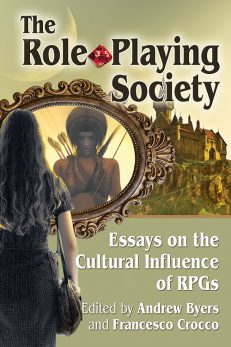The Role-Playing Society
Essays on the Cultural Influence of RPGs
$29.95
In stock
About the Book
Since the release of Dungeons & Dragons in 1974, role-playing games (RPGs) have spawned a vibrant industry and subculture whose characteristics and player experiences have been well explored. Yet little attention has been devoted to the ways RPGs have shaped society at large over the last four decades. Role-playing games influenced video game design, have been widely represented in film, television and other media, and have made their mark on education, social media, corporate training and the military. This collection of new essays illustrates the broad appeal and impact of RPGs. Topics range from a critical reexamination of the Satanic Panic of the 1980s, to the growing significance of RPGs in education, to the potential for “serious” RPGs to provoke awareness and social change. The contributors discuss the myriad subtle (and not-so-subtle) ways in which the values, concepts and mechanics of RPGs have infiltrated popular culture.
Instructors considering this book for use in a course may request an examination copy here.
About the Author(s)
Andrew Byers is a visiting assistant professor of history at Duke University. His research interests include popular culture, biopolitics, and the history of geek culture. He lives in Fairfax, Virginia.
Francesco Crocco is the associate director of the online writing lab at Excelsior College. His research interests include game-based learning, gamification, and utopian studies. He lives in Lafayette, Louisiana.
Bibliographic Details
Edited by Andrew Byers and Francesco Crocco
Format: softcover (6 x 9)
Pages: 320
Bibliographic Info: notes, bibliographies, index
Copyright Date: 2016
pISBN: 978-0-7864-9883-3
eISBN: 978-1-4766-2348-1
Imprint: McFarland
Table of Contents
Introduction 1
Part I. The Player’s Guide: The Psychological and Cultural Impact of a Game Genre
The Satanic Panic and Dungeons & Dragons: A Twenty-Five-Year Retrospective (Andrew Byers) 22
Psychological Effects of Fantasy Games on Their Players: A Discourse-Based Look at the Evidence (Andreas Lieberoth and Jonas Trier-Knudsen) 46
Building the Culture of Contingency: Adaptive Choice in Ludic Literature from Role-Playing Games to Choose Your Own Adventure Books (Tim Bryant) 72
Part II. The Tome of Knowledge: Playing to Learn in and across the Disciplines
Raiding the Last Frontier: Overcoming the Language Barrier in the ESL Classroom (Timm Woods) 98
“Do you want to be Dr. Frankenstein or Edna Pontellier?”: How Getting into Character Enhances Literary Studies (Jonathan M. Bradley) 122
Playing Between the Lines: Promoting Interdisciplinary Studies with Virtual Worlds (Reneta D. Lansiquot, Candido Cabo and Tamrah D. Cunningham) 143
Part III. The Book of Change: Enacting Social Transformations
Teacher as Dungeon Master: Connected Learning, Democratic Classrooms, and Rolling for Initiative (Antero Garcia) 164
Playing for Change: FreeMarket and the Rise of Serious Tabletop Role-Playing Games (Troy Leaman) 184
Leveling Influence: Klout and the Introduction of Social Leveling (Joseph B. Meyer) 208
Part IV. The Manual of Play: Seeding New Avenues of Gaming
Shapers, Portals and Exotic Matter: Living Fiction and Augmented Reality in Google’s Ingress (Kai-Uwe Werbeck) 234
Descent to Munchkin: From Pen-and-Paper to Board and Card (Cathlena Martin and Benton Tyler) 256
The RPG Classroom: Re-Purposing Game Mechanics for the Gamification of Education (Francesco Crocco) 278
About the Contributors 303
Index 307
Book Reviews & Awards
- “Interesting…excellent”—Game Nite Magazine
- “Byers and Crocco have put together a volume that both moves the field of RPG studies forward and increases its value to scholars of American culture.”—The Journal of American Culture
- “Engaging and easy to read”—Analog Game Studies
- “Examines how role-playing games, and especially Dungeons & Dragons since its introduction in 1974, have changed or affected individuals behaviors, lifestyles, educational growth and more…some of the articles, especially ones focusing on education, have significant ideas to impart and make for fascinating reading”—Bookgasm
- “Examines the impact role-playing games (RPGs) on society”—ProtoView
Author Interview
Review Fix chats with The Role-Playing Society: Essays on the Cultural Influence of RPGsco-editor Andrew Byers to find out why RPGs are a special genre in gaming and more.
Review Fix: What inspired the creation of this book?
Andrew Byers: When my co-editor, Francesco Crocco, and I initially conceived of the book, we were academics as well as tabletop role-playing gamers and we wanted to create a project that would give us a chance to write about role-playing games in an academic venue but in an approachable way that captured the games we’ve been playing for decades. As we started doing some research into other academic forays into role-playing games, we realized that while there is a considerable (and growing) body of academic research into RPGs, most of those efforts have sought to explore the practices of gaming and look inside gaming culture. That’s extremely valuable, and there are some great books and articles out there, but we wanted to reverse that idea: instead of looking inside gaming as a subculture, we wanted to look outside gaming and examine all of the social and cultural influences and impacts that RPGs have had on society. That was an untapped niche.
Review Fix: What makes the role-playing community worthy of a book like this in your opinion?
Byers: I’m hopelessly biased on this one: I’ve been playing RPGs since 1981. Other than reading and book collecting, RPGs have been my #1 hobby for as long as I can remember. I’ve made lifelong friends gaming and I’ve filled countless hours reading and playing RPGs. So I’m a gamer first and an academic second. It was only natural for me to see RPGs as worthy of a book like this.
Review Fix: What was the writing process like?
Byers: The writing process for my own article went really smoothly: it was a topic I already knew a good deal about, and the additional research required was a pleasure. Drafting my chapter in the book and my contributions to the introduction (along with my co-editor Francesco Crocco) were fun and without any particular problems. Editing the collection as a whole—wrangling the various chapter submissions, putting them through an intensive peer review process, getting them edited and revised—was more time-consuming and challenging. Managing a group of a dozen or more academics (who are also passionate gamers) was akin to herding the proverbial cats, but everyone was professional and a pleasure to work with. It just took more time and effort than anticipated, which is probably always the case for any book-length project.
Review Fix: What did you learn through the writing process that you weren’t expecting?
Byers: The full breadth of the impact of RPGs on society and culture. I expected that we would get a lot of chapter submissions on references to RPGs in movies and TV shows, and maybe a piece or two that talked about how they have come to influence computer games. We got some of those, but I didn’t expect that we’d see so many stories about how RPGs have been used in the classroom, as tools for teaching and motivating students. Gamification has become an important component of many enterprises, and that’s a direct result of the pervasiveness of RPGs and RPG elements in our society. That was really unexpected for me. It was great to learn about those things, I just didn’t realize that RPGs had been used for such important and meaningful purposes.
Review Fix: What are your goals for the book?
Byers: To educate and entertain. Each of the chapters is written by a gamer who also happens to be an academic. The book is useful for academics, but my hope is that it will also be of interest for gamers who aren’t academics as well. If you’re interested in taking a “serious” look at how influential your favorite RPGs have been, I think this book would be of interest.
Review Fix: How would you like it to be remembered?
Byers: Well, I think we’d obviously like the book to be read and reach an audience. In the case of my chapter in the book on the Satanic panic, I would hope that we can use this as a cautionary tale and all agree that we should never allow this kind of moral panic to take hold and cause so much harm, but sadly I still see small-minded calls for censorship and hand-wringing over Magic: The Gathering, Harry Potter, etc., so these ideas are still out there in some circles—we obviously didn’t learn our lessons from the D&D experience.
Review Fix: What’s next?
Byers: I’d love to continue studying RPGs as an academic, but I’d also really like to do more gaming! Here’s hoping I can get in more gaming in 2019!
Review Fix chats with The Role-Playing Society: Essays on the Cultural Influence of RPGs co-editor Francesco Crocco to find out why RPGs are a special genre in gaming and more.
Review Fix: What inspired the creation of this book?
Francesco Crocco: That’s a great question. I’ve been a huge fan and player of RPGs for two decades, and I wanted to share both my love of the game and my passion for how I and others have adapted it to serve purposes other than entertainment. I’ve been using RPG elements to enhance the way I teach for quite a long time and I knew that others were doing so, as well. This led me to investigate how RPGs might have seeped into other aspects of our culture. Andrew and I put out a call for essays, and we were pleased to get a wide array of responses. It corroborated my sense that RPGs in specific and play in general have many practical applications in our society.
Review Fix: What makes the role playing community worthy of a book like this in your opinion?
Crocco: Well, you mean besides the fact that RPGs and their players are awesome and completely under-appreciated? Seriously, RPGs have been a topic of cultural and scholarly analysis for quite some time now. My exposure to the gamification industry that was cresting a few years ago convinced me that RPGs were alive and well in forms well beyond their intended purpose. RPG elements were being appropriated in novel and effective ways, yet RPGs, their designers, and player communities were not being credited. I thought a book like ours could help raise awareness about the significance of RPGs beyond the comic shop and game store.
Review Fix: What was the writing process like?
Crocco: Mostly a delight, actually. Andrew is a phenomenal scholar, editor, and coordinator. He’s also friendly and punctual. Working with him made the process of calling for papers, reviewing contributions, co-writing an introduction, and shepherding the book through the various stages to publication extremely enjoyable. Plus, we’re both D&D geeks who share a love of the game, which made the whole thing really fun. Also, the editorial staff at McFarland was unbelievable friendly and helpful. Finally, it was incredibly satisfying to write about something I love, which made the whole thing wonderful.
Review Fix: What did you learn through the writing process that you weren’t expecting?
Crocco: Hmm, I learned how hard it is to stay within word limits! Seriously, I had to cut a lot from my article. But I was glad that we were able to recycle content in other places. I also learned how to coordinate all the papers so that we didn’t overlap very much. I wanted each paper to offer a unique contribution. To help with that, Andrew and I co-wrote an introduction that provided a context for the rest of the papers by defining and historicizing RPGs.
Review Fix: What are your goals for the book?
Crocco: Mainly, I hope it helps people understand what RPGs are and why they are still important in so many ways. They’re not just an odd reference in an episode of Big Bang Theory. There’s substance to them and they have changed the world in their own way.
Review Fix: How would you like it to be remembered?
Crocco: As an important contribution to a serious field of study.
Review Fix: What’s next?
Crocco: Great question! I’m working on a manuscript for a book that investigates what education will look like in a world without work. This is premised on speculations about the way advanced automation will fundamentally transform our society and how play might replace work as the basis of a new society. You know, light stuff!





